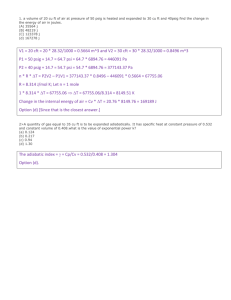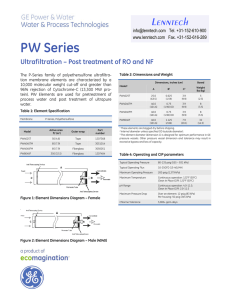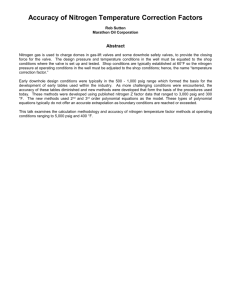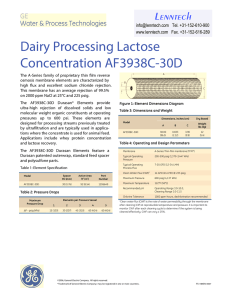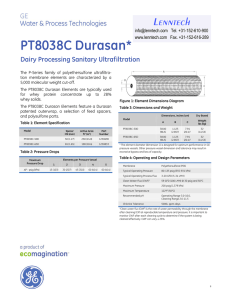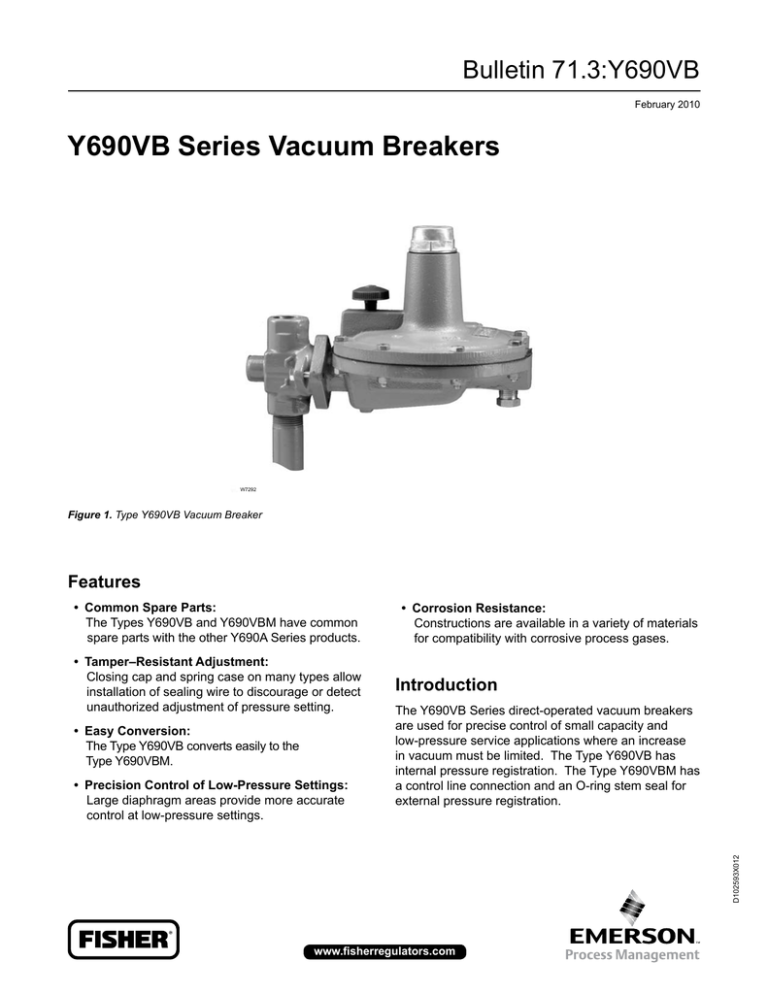
Bulletin 71.3:Y690VB
February 2010
Y690VB Series Vacuum Breakers
W7292
Figure 1. Type Y690VB Vacuum Breaker
Features
• Common Spare Parts:
The Types Y690VB and Y690VBM have common
spare parts with the other Y690A Series products.
• Corrosion Resistance:
Constructions are available in a variety of materials
for compatibility with corrosive process gases.
• Tamper–Resistant Adjustment:
Closing cap and spring case on many types allow
installation of sealing wire to discourage or detect
unauthorized adjustment of pressure setting.
Introduction
• Easy Conversion:
The Type Y690VB converts easily to the
Type Y690VBM.
D102593X012
• Precision Control of Low-Pressure Settings:
Large diaphragm areas provide more accurate
control at low-pressure settings.
The Y690VB Series direct-operated vacuum breakers
are used for precise control of small capacity and
low-pressure service applications where an increase
in vacuum must be limited. The Type Y690VB has
internal pressure registration. The Type Y690VBM has
a control line connection and an O-ring stem seal for
external pressure registration.
www.fisherregulators.com
Bulletin 71.3:Y690VB
Specifications
Construction Materials
Available Configurations
Type Y690VB: Direct-operated vacuum breaker with internal registration.
Type Y690VBM: Direct-operated vacuum breaker equipped with a blocked throat and control line connection for external pressure registration.
Body Sizes
NPS 3/4 or 1 (DN 20 or DN 25)
End Connection Styles
See Table 1
Temperature Capabilities(1)
Nitrile (NBR):
-20° to 180°F (-29° to 82°C)
Fluorocarbon (FKM):
40° to 300°F (4° to 149°C)
Ethylenepropylene (EPDM):
-20° to 300°F (-29° to 149°C)
Perfluoroelastomer (FFKM):
-20° to 300°F (-29° to 149°C)
Pressure Registration
Maximum Allowable Inlet Pressure(1)
See Table 3
150 psig (10,3 bar)
Type Y690VB: Internal
Type Y690VBM: External
Maximum Outlet (Casing) Pressure(1)
Orifice Size
Full Vacuum
Maximum Emergency Outlet Pressure to Avoid
Internal Parts Damage(1)
150 psig (10,3 bar)
Vacuum Control Pressure Ranges
Pressure Setting Adjustment
(1)
1/4-inch (6,3 mm)
1/2-inch (13 mm)
Adjusting Nut
Spring Case Connection
See Table 4
1/4 NPT
Flow Coefficients
Diaphragm Case Connection
See Table 2
1/2 NPT
Flow Capacities
Approximate Weight
See Table 6
19 pounds (9 kg)
1. The pressure/temperature limits in this Bulletin and any applicable standard or code limitation should not be exceeded.
Table 1. End Connection Styles
BODY SIZE,
NPS (DN)
3/4 (20)
1 (25)
Table 2. Flow Coefficients
END CONNECTION STYLE(1)
Ductile Iron
Stainless Steel
NPT
NPT, SWE, or ASME
CL150 RF
1. All flange dimensions are 14-inches (356 mm) face-to-face.
2
ORIFICE SIZE
INCHES (mm)
FLOW COEFFICIENT
Cg
Cv
C1
1/4 (6,3)
50
1.4
35
1/2 (13)
200
5.7
35
Bulletin 71.3:Y690VB
T
July 2007
Type Y692
VACUUM PUMP
VACUUM BEING LIMITED
INLET PRESSURE
CONTROL PRESSURE (VACUUM)
INLET PRESSURE
Control
pressure
(OUTLet PRESSURE)
ATMOSPHERIC
PRESSURE
ATMOSPHERIC PRESSURE
B2672
INLET PRESSURE
OUTLET PRESSURE
ATMOSPHERIC PRESSURE
POSITIVE PRESSURE OR ATMOSPHERE, OR A
LESSER VACUUM THAN THE ONE BEING LIMITED
Figure 2. Y690VB Series Operational Schematic
INLET PRESSURE
OUTLET PRESSURE
ATMOSPHERIC PRESSURE
LOADING PRESSURE
INTERMEDIATE PRESSURE
PILOT SUPPLY PRESSURE
INTERMEDIATE BLEED PRESSURE
PRE-EXPANSION PRESSURE
VACUUM PRESSURE
TANK PRESSURE
BYPASS PRESSURE
PUMP PRESSURE
BACK PRESSURE
3
Bulletin 71.3:Y690VB
Table 3. Construction Materials
BODY
SPRING CASE
DIAPHRAGM CASE
Ductile iron or CF8M
Stainless steel
Ductile iron or
CF8M Stainless steel
Ductile iron or
CF8M Stainless steel
TRIM
DIAPHRAGM
DISK
S303 Stainless steel
Nitrile (NBR) or
Fluorocarbon (FKM)
Nitrile (NBR) or
Fluorocarbon (FKM)
Table 4. Vacuum Control Pressure Ranges
Vacuum
Control
Pressure
Range(1)(2)
Change in vacuum to Wide-open
Spring
Part Number
spring color
spring wire
diameter
INCHES (mm)
spring Free
Length
INCHES (mm)
1.3-inches w.c.
(3 mbar)
0N039427222
Unpainted
0.062 (1,6)
3.06 (77)
10-inches w.c.
(25 mbar)
0.7 psig
(0,05 bar)
0N086127022
Unpainted
0.125 (3,2)
2.50 (63)
0 to 2.1 psig
(0 to 0,15 bar)
1.2 psig
(0,08 bar)
2.4 psig
(0,17 bar)
0N004327022
Yellow
0.172 (4,4)
2.50 (63)
0 to 5 psig
(0 to 0,35 bar)
3.2 psig
(0,22 bar)
6.3 psig
(0,43 bar)
1D1418227012
Dark blue
0.207 (5,3)
2.50 (63)
1/4-inch
(6,3 mm) Orifice
1/2-inch
(13 mm) Orifice
0 to 4-inches w.c.
(0 to 10 mbar)
0.6-inches w.c.
(1,5 mbar)
0 to 1.0 psig
(0 to 0,07 bar)
1. Spring ranges based on atmospheric inlet pressure.
2. To convert to inches Hg, multiply psig value by 2.04.
Table 5. Maximum Setpoints for Achieving Wide-Open Flow
Spring Range,
PART NUMBER,
AND COLOR(1)(2)
orifice size
INCHes (mm)
0 to 4-inches w.c.
(0 to 10 mbar)
0N039427222
Unpainted
1/4 (6,3)
0 to 1.0 psig
(0 to 0,07 bar)
0N086127022
Unpainted
1/4 (6,3)
0 to 2.1 psig
(0 to 0,14 bar)
0N004327022
Yellow
1/4 (6,3)
0 to 5 psig
(0 to 0,34 bar)
1D141827012
Dark blue
1/4 (6,3)
1/2 (13)
1/2 (13)
1/2 (13)
1/2 (13)
MAXIMUM
ALLOWED
VACUUM
5.1 psig
(0,35 bar)
6.0 psig
(0,41 bar)
7.1 psig
(0,49 bar)
12.0 psig
(0,83 bar)
1. Spring ranges based on atmospheric inlet pressure.
2. To convert to inches Hg, multiply psig value by 2.04.
4
MAXIMUM SETPOINTS FOR ACHIEVING WIDE-OPEN FLOW AT SPECIFIC INLET PRESSURES
0 Psi (0 bar)
25 Psi (1,7 bar)
50 Psi (3,4 bar)
75 Psi (5,2 bar)
100 Psi (6,9 bar)
125 Psi (8,6 bar)
4-inches w.c.
(10 mbar)
4-inches w.c.
(10 mbar)
3.5-inches w.c.
(8,7 mbar)
3-inches w.c.
(7,5 mbar)
2.5-inches w.c.
(6,2 mbar)
2-inches w.c.
(5 mbar)
4-inches w.c.
(10 mbar)
3-inches w.c.
(7,5 mbar)
1.5-inches w.c.
(3,7 mbar)
0-inches w.c.
(0 mbar)
0-inches w.c.
(0 mbar)
0-inches w.c.
(0 mbar)
1 psig
(0,07 bar)
1 psig
(0,07 bar)
1 psig
(0,07 bar)
1 psig
(0,07 bar)
0.96 psig
(0,07 bar)
0.92 psig
(0,06 bar)
1 psig
(0,07 bar)
0.95 psig
(0,07 bar)
0.9 psig
(0,06 bar)
0.85 psig
(0,06 bar)
0.8 psig
(0,05 bar)
0.75 psig
(0,05 bar)
2.1 psig
(0,14 bar)
2.1 psig
(0,14 bar)
2.1 psig
(0,14 bar)
2.1 psig
(0,14 bar)
2.05 psig
(0,14 bar)
2.0 psig
(0,14 bar)
2.1 psig
(0,14 bar)
2.1 psig
(0,14 bar)
2.05 psig
(0,14 bar)
1.98 psig
(0,14 bar)
1.92 psig
(0,13 bar)
1.86 psig
(0,13 bar)
5.0 psig
(0,34 bar)
5.0 psig
(0,34 bar)
5.0 psig
(0,34 bar)
5.0 psig
(0,34 bar)
5.0 psig
(0,34 bar)
5.0 psig
(0,34 bar)
5.0 psig
(0,34 bar)
5.0 psig
(0,34 bar)
5.0 psig
(0,34 bar)
5.0 psig
(0,34 bar)
5.0 psig
(0,34 bar)
5.0 psig
(0,34 bar)
Bulletin 71.3:Y690VB
Table 6. Type Y690VB Capacities
Spring Range,
PART NUMBER, AND COLOR(1)
vacuum
control setting(2)
0 to 4-inches w.c. (0 to 10 mbar)
0N039427222 Unpainted
2-inches w.c. (5 mbar)
0 to 1.0 psig (0 to 0,07 bar)
0N086127022 Unpainted
0.5 psig (0,03 bar)
0 to 2.1 psig (0 to 0,14 bar)
0N004327022 Yellow
2 psig (0,14 bar)
0 to 5 psig (0 to 0,34 mbar)
1D141827012 Dark blue
4 psig (0,28 bar)
capacities in scfh
(Nm³/h) OF 1.0 speCific
gravity air
orifice size
INCHES (mm)
CHange in VACUUM
to wide-open
1/4 (6,3)
0.6-inches w.c. (1,5 mbar)
110 (2,95)
1/2 (13)
1.3-inches w.c. (3 mbar)
486 (13,0)
1/4 (6,3)
10-inches w.c. (25 mbar)
293 (7,85)
1/2 (13)
0.7 psig (0,05 bar)
1382 (37,0)
1/4 (6,3)
1.2 psig (0,08 bar)
524 (14,0)
1/2 (13)
2.4 psig (0,17 bar)
2353 (63,1)
1/4 (6,3)
3.2 psig (0,22 bar)
682 (18,3)
1/2 (13)
6.3 psig (0,43 bar)
2910 (78,0)
1. Spring ranges based on atmospheric inlet pressure.
2. To convert to inches Hg, multiply psig value by 2.04.
Principle of Operation
Capacity Information
An increase in vacuum (decrease in absolute
pressure) beyond a setpoint registers on the
diaphragm, opening the disk. This permits
atmosphere, positive, or an upstream vacuum that
has higher absolute pressure than the downstream
vacuum, to enter the system and restore the controlled
vacuum to the setpoint. On the Type Y690VB,
the pressure registers internally underneath the
diaphragm. The Type Y690VBM has a control line
connecting the diaphragm casing to the vacuum line
and a throat seal allowing for registration only through
the control line connection.
To determine flow capacities for the Y690VB Series
vacuum breakers, use the following formula:
Installation
A Y690VB Series regulator may be installed in any
orientation as long as flow through it matches the
direction of the arrow on the body. Normal installation
is with the spring case vertical above or below the
diaphragm case. When exposed to the weather, the
vent should be protected by the optional umbrella
vent or pointed down to allow condensate to drain. If
used in hazardous gas service on indoor installations,
this connection should be piped outdoors. External
dimensions and connections are shown in Figure 3.
Note
Q = P1abs Cg SIN
P
3415
P1abs
C1
deg
where,
Q P1abs Cg C1 P
= flow capacity in scfh (60°F and 14.7 psia) of air
= absolute inlet pressure in psia
(P1 gauge + 14.7)
= flow coefficient (from Table 3)
= 35
= pressure drop across vacuum breaker
Note
If the actual change in (control) pressure
(from the service conditions) is less than
the minimum change in (control) pressure
required to fully open the vacuum breaker
(Table 6), the Cg in the formula must
be reduced accordingly. To obtain the
correct reduced Cg, multiply the Cg from
Table 2 by the ratio of the actual change in
(control) pressure to the minimum change
in (control) pressure required to fully
open the vacuum breaker.
Downstream piping will vary with the
installation, but to obtain the calculated
characteristics, the pipe should be the
same size as the outlet and should be
straight for the first 18 inches (457 mm).
5
Bulletin 71.3:Y690VB
Conversion Factors
To determine equivalent capacities for natural gas,
propane, butane, or nitrogen, multiply the calculated
capacity by the following appropriate conversion
factor: 1.29 for natural gas, 0.810 for propane, 0.707
for butane, or 1.018 for nitrogen. For gases of other
specific gravities, divide by the square root of the
appropriate specific gravity. Then, if capacity is
desired in normal cubic meters per hour at 0°C and
1.01325 bar, multiply scfh by 0.0268.
2. Solve the problem by using the appropriate
values in the formula as follows, remembering
that the P across the vacuum breaker is
9-inches w.c. (0.325 psig) (22 mbar):
Example Problem Using Formula
Ordering Information
This example involves a Type Y690VB vacuum breaker
with its outlet connected to a vessel in which the vacuum
must be limited. This breaker has a 1/4-inch (6,4 mm)
orifice and a control spring set to start opening and
admit atmospheric pressure whenever the vacuum
pump downstream from the vessel increases the vessel
vacuum to more than 4-inches w.c. (10 mbar). It is
desirable to find the air flow by the time the pump has
increased the vessel vacuum to 9-inches w.c. (22 mbar)
and the breaker has opened more. To find the air flow
through the breaker under these conditions:
When ordering, specify:
1. Check whether the change in outlet (controlled)
pressure of 5-inches w.c. (12 mbar) is less than the
minimum change in outlet (controlled) pressure
required to fully open the vacuum breaker. Since
the minimum change in outlet (controlled) pressure
required to fully open the vacuum breaker with
a 1/4-inch (6,4 mm) orifice and control spring is
0.6-inches w.c. (1,5 mbar) from Table 4, no
reduction in the regulating Cg of 50 (Table 2) need
be made.
6
Q = 14.7(50) SIN
3415
35
0.325
DEG
14.7
=184 scfh (4,93 Nm³/h) of Air
Application
1. Composition and specific gravity of gas (including chemical analysis if possible)
2. Range of temperatures, flowing inlet pressures (maximum, minimum, nominal), and
pressure drops
3. Desired pressure setting or range
4. Range of flow rates (minimum controlled,
maximum, normal)
5. Piping size(s)
Construction
Refer to the Specifications section and to each
referenced table; specify the desired selection
whenever there is a choice to be made. Always
be sure to specify the type number and the spring
case orientation.
Bulletin 71.3:Y690VB
1/4 npt vent
6.04
(153)
NPT SWE
14
(356)
A
b
1/2 npt
control line
connection
8.38
(213)
D
f
g
b2673
inches
(mm)
Dimensions, inches (mm)
Body Size,
NPS (DN)
3/4 (20),
1 (25)
a
b
d
f
g
Ductile
Iron NPT
Stainless
Steel NPT
Ductile
Iron
Stainless
Steel
Ductile
Iron
Stainless
Steel
Ductile
Iron
Stainless
Steel
Ductile
Iron
Stainless
Steel
4.00 (102)
4.12 (105)
2.12 (54)
2.25 (57)
6.18 (157)
6.18 (157)
10.37
(263)
10.37
(263)
1.53 (39)
1.53 (39)
Figure 3. Dimensions
7
Bulletin 71.3:Y690VB
Industrial Regulators
Natural Gas Technologies
TESCOM
Emerson Process Management
Regulator Technologies, Inc.
Emerson Process Management
Regulator Technologies, Inc.
Emerson Process Management
Tescom Corporation
USA - Headquarters
McKinney, Texas 75069-1872 USA
Tel: 1-800-558-5853
Outside U.S. 1-972-548-3574
USA - Headquarters
McKinney, Texas 75069-1872 USA
Tel: 1-800-558-5853
Outside U.S. 1-972-548-3574
USA - Headquarters
Elk River, Minnesota 55330-2445 USA
Tel: 1-763-241-3238
Asia-Pacific
Shanghai, China 201206
Tel: +86 21 2892 9000
Asia-Pacific
Singapore, Singapore 128461
Tel: +65 6777 8211
Europe
Bologna, Italy 40013
Tel: +39 051 4190611
Europe
Bologna, Italy 40013
Tel: +39 051 4190611
Gallardon, France 28320
Tel: +33 (0)2 37 33 47 00
Middle East and Africa
Dubai, United Arab Emirates
Tel: +971 4811 8100
Europe
Selmsdorf, Germany 23923
Tel: +49 (0) 38823 31 0
For further information visit www.fisherregulators.com
The Emerson logo is a trademark and service mark of Emerson Electric Co. All other marks are the property of their prospective owners. Fisher is a mark owned by Fisher Controls, Inc., a
business of Emerson Process Management.
The contents of this publication are presented for informational purposes only, and while every effort has been made to ensure their accuracy, they are not to be construed as warranties or
guarantees, express or implied, regarding the products or services described herein or their use or applicability. We reserve the right to modify or improve the designs or specifications of such
products at any time without notice.
Emerson Process Management does not assume responsibility for the selection, use or maintenance of any product. Responsibility for proper selection, use and maintenance of any Emerson
Process Management product remains solely with the purchaser.
©Emerson Process Management Regulator Technologies, Inc., 1999, 2010; All Rights Reserved

